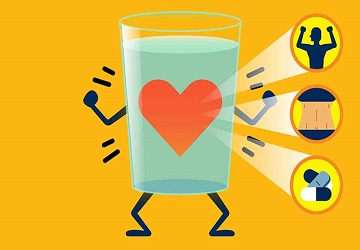Health Benefits of Hydration

The most important factor for our physical health and wellbeing is water. The reason for this is that every cell in the body depends on water for nourishment as well as waste removal. Water or hydration as the process is known is a basic requirement for bodily physiological functions such as carrying nutrients to cells, digestion, controlling body temperature, regulating blood pressure, enhancing the texture of the skin and waste removal.
Boosting health
A properly hydrated body is full of vitality and energy and gives stamina for better endurance. The weight of a person is also stabilized by drinking adequate water. A person drinking sufficient water will find out that it helps to not only clear the mind but also allows a person to deal with stress. In the longer run, ample hydration is instrumental in slowing down the aging process and boosting general health.
Balance of fluids
The balance of fluids within the body is determined by the amount of water that is taken in on a daily basis. This is a daily function as water is not stored but is expelled from the body constantly. The fluids within the body carry nutrients and the concentration of these fluids impact the internal body functions and their balance which are mainly:
- Creating the environment necessary for chemical processing within each cell in order to facilitate the production of energy and thus develop growth
- Strengthening of cells and tissues and giving them structure
- Acting as the medium for the disposal of waste and toxins from each cell
- Maintenance of body temperature
Our body houses a complex mechanism to ensure the balance of body water. The brain sends messages through the posterior pituitary gland to the kidneys as to the amount of water the body should hold onto as reserves and the amount it should excrete. When the water levels are low the brain triggers our thirst mechanism and we should replenish the water level immediately. We do this normally by reaching out for a glass of water or a drink automatically. Any type of drink will quench thirst other than alcohol. The reason why alcohol makes you even more dehydrated is because it confuses the messaging between the brain and kidneys and as a result the body excretes more fluids.
Daily requirement
The daily recommended dosage of water for an adult is eight glasses or a minimum of 2 liters. We also take about 0.5liters of water through our food. In fact, this is equal to what your body loses on a daily basis. An adult loses about 2.5 liters of water through bodily functions such as sweating, urinating, excreting and even breathing.
Skin
Water is essential for good skin. The skin is the largest organ of the body and is our first defense against infections and other diseases. In addition, water helps the skin to be supple preserving its elasticity and softness. A properly hydrated body will have skin that is clear enhancing beauty. However, it should be noted that while water is good for the skin it cannot stop aging and over hydration will only result in the kidneys excreting the excess water.
Brain
Brain functions are maintained by adequate supplies of blood containing oxygen. This is facilitated by proper hydration and the brain will be alert. Dehydration causes the impairment of the brain by lessening concentration and even short term memory.
Heart
The functions of the heart need the medium of liquid to pump blood to the body. Water balance helps to maintain blood pressure levels and the distribution of nutrients through blood. Blood pressure can be affected by dehydration and will increase the heart rate.
Digestive tract
Good metabolism is the key to a healthy body. Water helps to digest food, dissolve and absorb nutrients and transport them to each and every cell. Decreased levels of water within the body will result in constipation.
Muscles and joints
Body form and posture is determined by muscles and bones. Water acts as a lubricant in joints and cushions them against sudden impacts. Muscles contain about 70 to 75 percent water and will not function properly when dehydrated. Cells shrivel without water and fatigue sets in. This is the reason why fluid intake is recommended when exercising
Kidneys
This is the organ that is most affected when the body is dehydrated. It is responsible for the excretion of excess nutrients, waste and water from the body through urination. It also controls the levels of sodium and electrolytes. A normal kidney filters around 180 liters of fluid daily. A good indication that your body has sufficient amount of water is when your urine is light in color and free of strong odors. Lack of adequate water can cause kidney stones.
Body temperature
The body regulates the temperature of the body through the mechanism of sweating. It prevents overheating and acts as a thermoregulator. Sweating cools the body.
